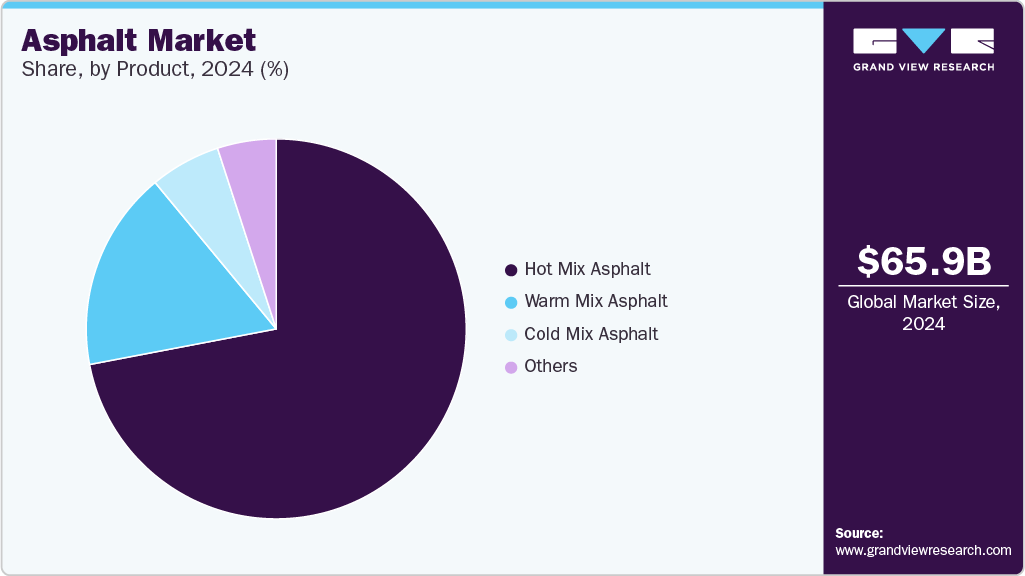The global asphalt market was valued at USD 65.91 billion in 2024 and is projected to reach USD 83.35 billion by 2030, exhibiting a compound annual growth rate (CAGR) of 4.0% from 2025 to 2030. This expansion is primarily driven by the increasing worldwide demand for air travel and international trade, which necessitates significant investments in airport and port infrastructure.
Asphalt is crucial for constructing runways, taxiways, container yards, and storage areas due to its robust load-bearing capabilities and resistance to heavy traffic. This demand substantially contributes to market growth, particularly in rapidly developing and high-traffic regions. Innovations in asphalt production, such as warm mix asphalt (WMA), recycled asphalt pavement (RAP), and polymer-modified asphalt (PMA), are enhancing material performance, reducing emissions, and improving sustainability. Governments and industries are increasingly adopting these eco-friendly asphalt variants to comply with regulatory and environmental standards, thereby stimulating market growth. These advancements not only support environmental objectives but also lead to lower lifecycle costs, making asphalt a more attractive option for infrastructure development.

Key Market Insights:
- The Asia Pacific asphalt market dominated the global landscape, holding approximately 38.81% of the revenue share in 2024. This is largely due to rapid urbanization and continuous infrastructure investments in major economies including India, Japan, South Korea, and Southeast Asian countries.
- By product type, the hot mix asphalt segment led the market, accounting for 72.1% of the revenue share in 2024. This dominance is attributed to its superior performance characteristics and widespread use in infrastructure development.
- In terms of end-use, the infrastructural segment was the largest, capturing 70.2% of the revenue share in 2024. This is driven by the escalating demand for road and highway development in both established and emerging economies.
Order a free sample PDF of the Asphalt Market Intelligence Study, published by Grand View Research.
Market Size & Forecast
- 2024 Market Size: USD 65.91 Billion
- 2030 Projected Market Size: USD 83.35 Billion
- CAGR (2025-2030): 4.0%
- Asia Pacific: Largest market in 2024
Key Companies & Market Share Insights
Key players in the market include CEMEX S.A.B. de C.V. and China Petroleum & Chemical Corporation (Sinopec).
- CEMEX is a global building materials leader offering a broad range of construction products, including asphalt. Its solutions, such as VIALOW, are designed for enhanced performance and sustainability. VIALOW enables faster road reopening due to its low-temperature application and helps reduce carbon emissions, supporting eco-friendly construction practices.
- Sinopec, one of China's largest integrated energy and chemical companies, produces a wide array of petroleum products, including asphalt. Their asphalt is widely used in road construction and maintenance, tailored to perform under varying climate and traffic conditions, ensuring long-term durability and efficiency.
Key Players
- CEMEX S.A.B. de C.V.
- China Petroleum & Chemical Corporation
- Exxon Mobil Corporation
- Marathon Petroleum Corporation
- Royal Dutch Shell
- United Refining Company
- Boral
- Valero Marketing and Supply Company
- HeidelbergCement AG
Explore Horizon Databook – The world's most expansive market intelligence platform developed by Grand View Research.
Conclusion
In conclusion, the global asphalt market is on a steady growth trajectory, fueled by the increasing demand for durable, cost-effective, and sustainable infrastructure solutions. Rising investments in airport, port, and roadway development—particularly in rapidly urbanizing regions like Asia Pacific—are driving significant market momentum. Technological advancements such as warm mix asphalt, recycled materials, and polymer-modified variants are reshaping industry practices, aligning with environmental regulations and reducing lifecycle costs. As governments and private sectors continue to prioritize resilient and eco-friendly infrastructure, asphalt remains a cornerstone material in global construction efforts, supported by key players committed to innovation and sustainability.








